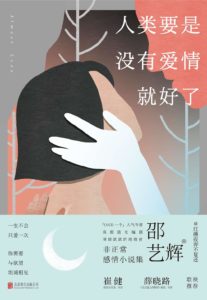B for Busy
爱情神话
China, 2021, colour, 2.35:1, 112 mins.
Director: Shao Yihui 邵艺辉.
Rating: 8/10.
Shanghai neighbourhood movie, led by droll comedian Xu Zheng, is a striking debut by writer-director Shao Yihui.
Shanghai, the present day. Bai (Xu Zheng) is a respected painter who lives in a house in the city’s French Concession area and teaches painting to old friends. Divorced, with a son, Bai Ge (Huang Minghao), who lives with his ex-wife Beibei (Wu Yue), he lets out his spare room rent-free to a Chinese-speaking Iranian, Alexander (Hamzah Mohamed Nagi al-Salami), and refuses to hold an exhibition of his work despite the constant nagging of his old friend and neighbour Wu (Zhou Yemang). Apart from painting, he’s also interested in cooking. One evening he goes on a date with Li (Ma Yili), a middle-aged divorcee with a half-English daughter, Maya (Feng Maya), who produces TV commercials. After going to a play at Shanghai Dramatic Arts Centre, she goes back to his house and spends the night there, though next morning she sneaks out without seeing him, and only answers his texts monosyllabically. After finding where she lives from mutual friend Wu Xiaoyun, Bai turns up at Li’s door, a tiny flat where she and Maya live with Li’s naggy mother (Wu Mian). Bai bonds with Maya and takes with him one of Li’s shoes whose heel is broken. Meanwhile, Wu finds a place for Bai to hold an exhibition but Bai rejects it as being too small. Wu Xiaoyun, who works for Li, asks Bai to be a hand double for a painter in a commercial. Li seems happy to see him again and she lets Bai look after Maya one day; she says she’ll come round to his house to collect the shoe, which Bai’s local cobbler (Ning Li) has repaired. Bai dresses smartly and prepares plenty of finger food for the evening; but just as Li is about to arrive, one of Bai’s pupils, the flirtatious, self-obsessed Gloria (Ni Hongjie), turns up at his door, in yet another tither over her “missing” Taiwan husband. When Li arrives, Gloria is still there – despite Bai’s efforts to get rid of her – and welcomes her in. Then Alexander comes back with a girl, and then Beibei drops by, and then Wu – leading to a full-scale drinks party. Next morning Bai eventually wakes up to find Gloria making him breakfast, the shoe gone, and no sign of Li at all.
REVIEW
 One of the best and freshest Mainland films of 2021, B for Busy 爱情神话 also marks the directing debut of Shao Yihui 邵艺辉, 30, previously known as a writer and especially for her first collection of short stories, Almost Love 人类要是没有爱情就好了, published in 2016 (see cover, left). Creatively produced 监制 by popular comic actor Xu Zheng 徐峥, 49, B for Busy is a typical “Shanghai neighbourhood” yarn – of the type that Shanghai-born Xu has made his own – that’s centred on a professional painter and the women and friends in his life, all viewed with a droll humour, plus a sense of community and ensemble that used to be quite common in Mainland cinema but has nowadays become rarer as society has changed. Released in late December, and definitely not made for the millennial crowd, it’s taken a very nice RMB248 million in its first four weeks. [Final tally was RMB260 million.]
One of the best and freshest Mainland films of 2021, B for Busy 爱情神话 also marks the directing debut of Shao Yihui 邵艺辉, 30, previously known as a writer and especially for her first collection of short stories, Almost Love 人类要是没有爱情就好了, published in 2016 (see cover, left). Creatively produced 监制 by popular comic actor Xu Zheng 徐峥, 49, B for Busy is a typical “Shanghai neighbourhood” yarn – of the type that Shanghai-born Xu has made his own – that’s centred on a professional painter and the women and friends in his life, all viewed with a droll humour, plus a sense of community and ensemble that used to be quite common in Mainland cinema but has nowadays become rarer as society has changed. Released in late December, and definitely not made for the millennial crowd, it’s taken a very nice RMB248 million in its first four weeks. [Final tally was RMB260 million.]
The film is also notable for some 95% of its dialogue being in Shanghainese rather than Mandarin, which adds considerably to its verismo feel. Though it’s quite common for Shanghai-set films to include a smattering of the local dialect for flavour, and the period drama The Wasted Times 罗曼蒂克消亡史 (2016) had roughly 50% of its dialogue in Shanghainese, it’s unheard of for a Mainland feature film to be almost entirely in the dialect (which has its own unique musical sound, and is only vaguely intelligible to Mandarin-speakers). Apart from Xu, who plays the lead role, most of the main cast are also Shanghaiers or born in the region.
The irony is that writer-director Shao is actually a northerner. Born in Shanxi province in May 91, she studied scriptwriting at Beijing Film Academy and only moved south to Shanghai around 2016, supporting herself (hardly) by writing and with the help of her mother. Her only previous film credit is as one of three writers on the formulaic but entertaining rom-com The Youth That Is Fading Away 既然青春留不住 (2015), a vehicle for two actor-singers (Taiwan’s Chen Qiao’en 陈乔恩 and Mainlander Zhang Han 张翰) that came and went with hardly a ripple. Given Shao’s lack of basic film-making experience, it’s a moot point how much Xu influenced the movie, given his long experience as an actor, director, writer and producer. Whatever the case, the result is almost completely successful, and it will be interesting to see where Shao goes from here.
Entirely set in the typically tree-lined district of Shanghai known as the French Concession, with its courtyards, old-style houses and colourful characters, B for Busy breathes the city in the way that the courtyard ensemblers of director An Zhanjun 安战军 used to breathe Beijing (Hutong Days 胡同里的阳光, 2008; Glittering Days 万家灯火, 2009). From its opening images of middle-aged painter Bai teaching his mature students in his tiny garden, while engaging in grouchy banter with his neighbour Wu and young Iranian lodger Alexander, this is Movie Shanghai writ large. It’s also a role Xu can play blindfold (compare his Shanghai episodes in the portmanteau My People, My Country 我和我的祖国, 2019, and My Country, My Parents 我和我的父辈, 2021) and, although he generally underplays his role in favour of other, noisier characters, it’s his droll, understated humour that gives the film its special appeal.
The plot is more a collection of setpieces than an evolving story, as the long-divorced Bai cautiously dates a middle-aged divorcee (subtly played by Ma Yili 马伊琍, 45, so good as the co-lead in Lost, Found 找到你, 2018) but still finds his life entangled with his domineering ex-wife (Wu Yue 吴越, the affection-starved wife in Glittering Days) and a horny pupil (versatile Ni Hongjie 倪虹洁, Sunny Sisters 阳光姐妹淘, 2021) who claims her husband has been kidnapped by terrorists. The major setpiece comes halfway through, as Bai and the divorcee finally arrange a quiet get-together at his home but are then invaded by a succession of friends. Typically, the sequence doesn’t develop in a conventional way, and prefigures the warm, very inclusive ending in which all the main characters form a mini-community of their own – in a way that strongly mirrors the middle-period movies of the late French master Claude Sautet (Vincent, François, Paul…et les autres, 1974; Une histoire simple, 1978; Garçon!, 1983). Friends change, have affaires, split up, and make up – and life carries on, with everyone a little bit wiser and a little bit more tolerant.
In Shao’s script, everyone gets their moment and all characters are seen from all angles – another refreshing touch. Ma’s divorcee is neither eager nor indifferent to another romantic entanglement; Wu’s ex-wife is neither a harridan nor a pushover; and Ni’s horny pupil is neither completely mad nor an unthinking man-eater). Shao also stirs in plenty of supporting denizens for colour – the philosophical neighbourhood cobbler, Bai’s blustering neighbour Wu, the divorcee’s half-English daughter – and each of them has true moments as well, with Wu (nicely played by Shanghai veteran Zhou Yemang 周野芒) providing one of the film’s highlights with a dinner speech about his youth. Occasionally, as in the sub-strand of Bai’s son and his floating sexuality, or the finale where the leads all watch a film with the same title, does Shao over-step herself and become too right-on; otherwise, it’s a remarkably subtle and mature screenplay that rarely trumpets its themes.
Adding to the film’s relaxed feel is the fact that none of the characters are ever identified by their full names: Bai is always “old Bai”, the divorcee is always “Miss Li”, and so on. Occasional in-jokes, which have a very Xu-like feel, pepper the film but don’t stand out: the pretentious play that the couple are seen leaving at the start has the same title as Shao’s first book (“The original is much better,” quips Bai), and industry barbs like Mainland movies not mentioning they’re remakes in their publicity.
Direction is mobile but smooth, and all in the service of the cast and the ensemble. Widescreen photography of springtime Shanghai by d.p. Chen Jun 陈军 feels absolutely real. The film’s strange English title stems from the translation in the subtitles of the nickname of Bai (“B”) that has nothing to do with its meaning in Chinese. The film’s original title literally means “Love Myth(s)” – which is also the title under which Federico Fellini’s 1969 movie, Satyricon (jokingly referenced at the end by Bai), is known in China. Shao is on record as saying it’s one of her favourites.
CREDITS
Presented by MaxTimes Pictures (Hubei) (CN), Beijing Joy Leader Culture & Communication (CN), Shanghai Film Group (CN), Beijing Buying Chuanqi Culture Media (CN).
Script: Shao Yihui. Photography: Chen Jun. Editing: Huang Qiongyi. Music supervision: Wen Zi. Art direction: Fu Yingzhang. Styling: Wei Xiangrong. Sound: Wen Bo.
Cast: Xu Zheng (Bai), Ma Yili (Li), Wu Yue (Beibei), Ni Hongjie (Gloria), Zhou Yemang (Wu), Huang Minghao (Bai Ge, Bai’s son), Wang Yinglu (Yangyang, Bai Ge’s girlfriend), Ning Li (cobbler), Zhang Zhihua (Bai’s mother), Wu Mian (Li’s mother), Feng Maya (Maya, Li’s daughter), Hamzah Mohamed Nagi al-Salami (Alexander), Hu Shengyi (Bai Ge’s blind date), Zhao Yinyin (opinionated man at gallery).
Release: China, 24 Dec 2021.
